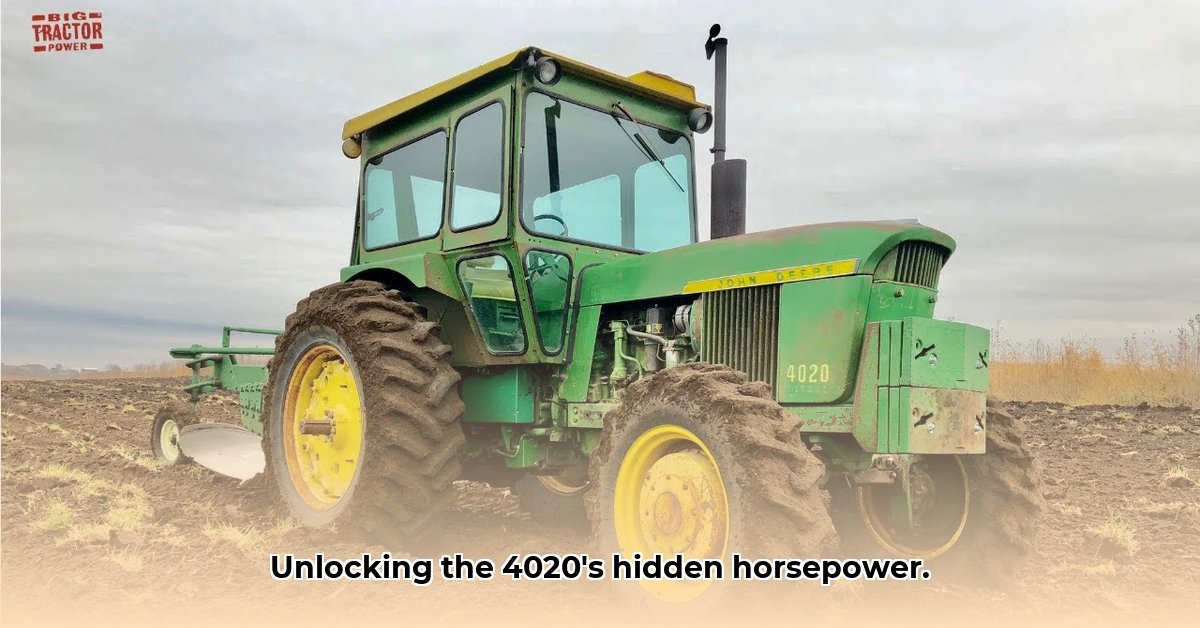
Unleashing the Power: Engine Options and Horsepower
The John Deere 4020, a legendary tractor, offered farmers a choice of gasoline, diesel, or liquid propane gas (LPG) engines. Each engine type delivered varying horsepower, impacting fuel consumption and operating costs. Understanding the 4020's capabilities requires defining key terms: PTO (Power Take-Off) horsepower (power for equipment like hay balers) and drawbar horsepower (pulling power for plowing). These distinctions are crucial when comparing the tractor's performance. For more details on other John Deere models, check out this helpful resource.
The following table summarizes the approximate horsepower for each engine type:
| Engine Type | PTO Horsepower (approx.) | Drawbar Horsepower (approx.) | Fuel Efficiency | Typical Characteristics |
|---|---|---|---|---|
| Gasoline | 65-70 | 50-55 | Lower | Simpler design, but often required more maintenance. Less powerful. |
| Diesel | 70-75 | 55-60 | Higher | More reliable, longer lifespan, and more fuel-efficient. |
| LPG | 70 | 55 | Moderate | Less common; required specialized fueling infrastructure. |
Note: These figures are approximate and vary based on workload and terrain.
Compared to its predecessors, the 4020 represented a significant leap in power and productivity, transforming farming practices. But how did these horsepower figures translate into real-world impact?
Transforming Farming: The 4020's Impact on Agricultural Practices
The 4020's power and versatility enabled farmers to cultivate larger fields and tackle more demanding tasks with increased efficiency. This significantly shortened harvest times and boosted overall farm yield. "The 4020's robust design and improved horsepower allowed us to significantly increase the scale of our operations," recalls James Miller, a retired farmer from Iowa. Its adaptability to various implements further cemented its popularity. But its legacy isn't without nuance concerning sustainability.
Was the 4020's impact purely positive? A closer examination reveals a more complex picture.
Sustainability and the 4020: A Balanced Perspective
While the 4020 revolutionized agricultural efficiency, it's crucial to evaluate its environmental implications. The gasoline and LPG engines, while offering convenience, exhibited lower fuel efficiency and higher emissions compared to the diesel variant. This contrasts sharply with modern tractors prioritizing fuel efficiency and reduced emissions. The 4020 can be viewed as a pivotal step in agricultural mechanization, significantly improving productivity yet contributing to environmental concerns. The sheer production volume of 184,879 units further amplifies its impact on resource consumption. What lessons can we learn from this historical perspective?
The remarkable number of 4020 units produced highlights the tractor's widespread adoption and success, but also raises important questions about sustainable agricultural practices.
Then and Now: Comparing the 4020 to Modern Tractors
The 4020's horsepower pales in comparison to modern tractors. Today's machines boast significantly higher power outputs, superior fuel efficiency, drastically reduced emissions, and advanced precision farming technologies. Moreover, modern tractors provide operators with significantly improved comfort and safety features. While the 4020's mechanical simplicity holds nostalgic appeal, modern tractors excel in efficiency, sustainability, and overall performance. This comparison underscores the incredible technological advancements in agriculture. How can we learn from this technological evolution to optimize sustainable practices?
The contrast between the 4020 and modern tractors vividly illustrates the ongoing evolution of agricultural technology and priorities.
A Lasting Legacy: The 4020's Enduring Influence
The John Deere 4020's legacy extends beyond its horsepower; it represents a pivotal moment in agricultural history. While its contribution to increased productivity is undeniable, understanding its limitations, particularly its environmental footprint, is crucial. The 4020 serves as a case study in technological progress, highlighting the shift towards sustainability and precision agriculture. Further investigation into the long-term environmental effects of farming practices during the 4020's era is vital for a comprehensive understanding of its impact.
The 4020's story exemplifies technological evolution within the agricultural sector and the continuous adaptation of farming practices.
Key Pivotal Points:
- Technological Leap: The John Deere 4020 represented a significant increase in agricultural productivity compared to earlier tractors.
- Engine Variety: The availability of gasoline, diesel, and LPG engine options catered to diverse farmer needs and preferences.
- Sustainability Considerations: The tractor's environmental impact, particularly concerning emissions, highlights the importance of sustainable agricultural practices in modern farming.